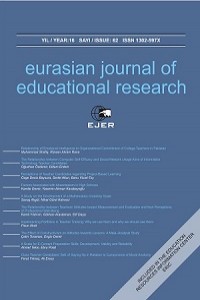Educational Leadership and Job Satisfaction of Teachers: A Meta-Analysis Study on the Studies Published between 2000 and 2016 in Turkey
Abstract
Problem Statement: The number of studies on the effect of educational leadership on several organizational outputs is increasing. The most popular topic to review within the framework of leadership is job satisfaction. In several studies, a positive correlation was found between leadership and job satisfaction. According to the two-factor theory of Herzberg (1966), the leadership approaches of leaders affect teachers’ job satisfaction. This is due to the fact that the administrators are an important part of the work done at school; and they contribute to teachers’ experiences in a positive or negative way.
Purpose of the Study: The aim of this study is to test the effect of educational leadership on teachers’ job satisfaction using the method of meta-analysis.
Method: In order to define the type of research that needs to be included into the meta-analysis of this study, an in-depth search was made in the Council of Higher Education (YÖK), the Turkish National Academic Network and Information Center (ULAKBİM), and Google Scholar databases. In this phase, the research process was reduced to only certain keywords, titles, and abstracts, based on the terms leadership, and only using job satisfaction, vocational satisfaction, and work satisfaction. The latest date of research included in this study is January 2016. In using meta-analysis, all doctoral and post-graduate dissertations, articles published in refereed and non-refereed journals, seminars, notices, and books on the
subject can be used. However, in this study, only doctoral and post-graduate dissertations and articles published in refereed and non-refereed journals were included in the analysis. The Pearson correlation coefficient (r) was determined to be the impact quantity in this study. A random effects model was applied in the meta-analysis processes in this study. Comprehensive Meta-Analysis software was used in these processes.
Findings: The mean effect size of educational leadership on job satisfaction was found to be .53. This value indicates that educational leadership has a strong impact on job satisfaction. According to the results of the meta-analysis, transformational [r = .52], cultural [r = .59], visionary[r = .47], and educational [r = .60] leadership styles were found to have a strong effect on job satisfaction, and leadership style was found to have a moderate effect.
Conclusion and Recommendations: According to the results of the meta-analysis, only the sampling region was determined to have a statistical significance among the determined moderator variables. The fact that only positive leadership styles and job satisfaction were covered by the study may have had an effect on the results obtained. So, future studies using meta-analysis can be designed to include negative leadership attitudes and outputs received from schools. In regard to organizational outputs, negative leadership approaches may occasionally offer better explanations than the positive leadership ones. Finally, this context should be considered, and studies designed to include leadership styles and other organizational outputs covering job satisfaction should be conducted with meta-analysis, as they would be likely to obtain more detailed information to explain related concepts.
Keywords: Leadership, educational leadership, job satisfaction, meta-analysis
Details
| Journal Section | TS |
|---|---|
| Authors | |
| Publication Date | February 15, 2016 |
| Published in Issue | Year 2016 Volume: 16 Issue: 62 |


